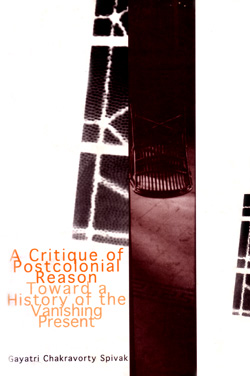A Critique of Postcolonial Reason
Toward a History of the Vanishing Present
Gayatri Chakravorty Spivak
6.5 x 9.5 inches, xiii + 449pp. 1999
ISBN : 9788170461630
Rs 695.00 (PB)
$0.00 (PB)
£0.00 (PB)
Are the ‘culture wars’ over? When did they begin? What is their relationship to gender struggle and the dynamics of class? In her first full treatment of postcolonial studies, a field that she helped define, Gayatri Chakravorty Spivak, one of the world’s foremost literary theorists, poses these questions from within the postcolonial enclave.
'We cannot merely continue to act out the part of Caliban,' Spivak writes; and her book is an attempt to understand and describe a more responsible role for the postcolonial critic. A Critique of Postcolonial Reason tracks the figure of the 'native informant' through various cultural practices—philosophy, history, literature—to suggest that it emerges as the metropolitan hybrid. The book addresses feminists, philosophers, critics, and interventionist intellectuals, as they unite and divide. It ranges from Kant’s analytic to the sublime to child labour in Bangladesh.
Throughout, the notion of a Third World interloper as the pure victim of a colonialist oppressor emerges as sharply suspect: the mud we sling at a certain seemingly overbearing ancestors such as Marx and Kant may be the very ground we stand on.
A major critical work, Spivak’s book redefines and repositions the postcolonial critic, leading her through transnational cultural studies into considerations of globality.
Gayatri Chakravorty Spivak, Avalon Foundation Professor in the Humanities and Director of the Center for Comparative Literature and Society at Columbia University, teaches English and the politics of culture. Author of Myself Must I Remake (1974), In Other Worlds (1987), The Post-Colonial Critic (1988), Outside in the Teaching Machine (1993), A Critique of Postcolonial Reason (1999), and Death of a Discipline (2003), she has also translated Jacques Derrida’s Of Grammatology (1976) and Mahasweta Devi’s Imaginary Maps (1994), Breast Stories (1997), Old Women (1999), and Chotti Munda and His Arrow (2002). Spivak’s work has been translated into all the major European and Asian languages.
Spivak
Postcolonial Studies
Literary Theory
Culture Studies

 Buy (PB)
Buy (PB)